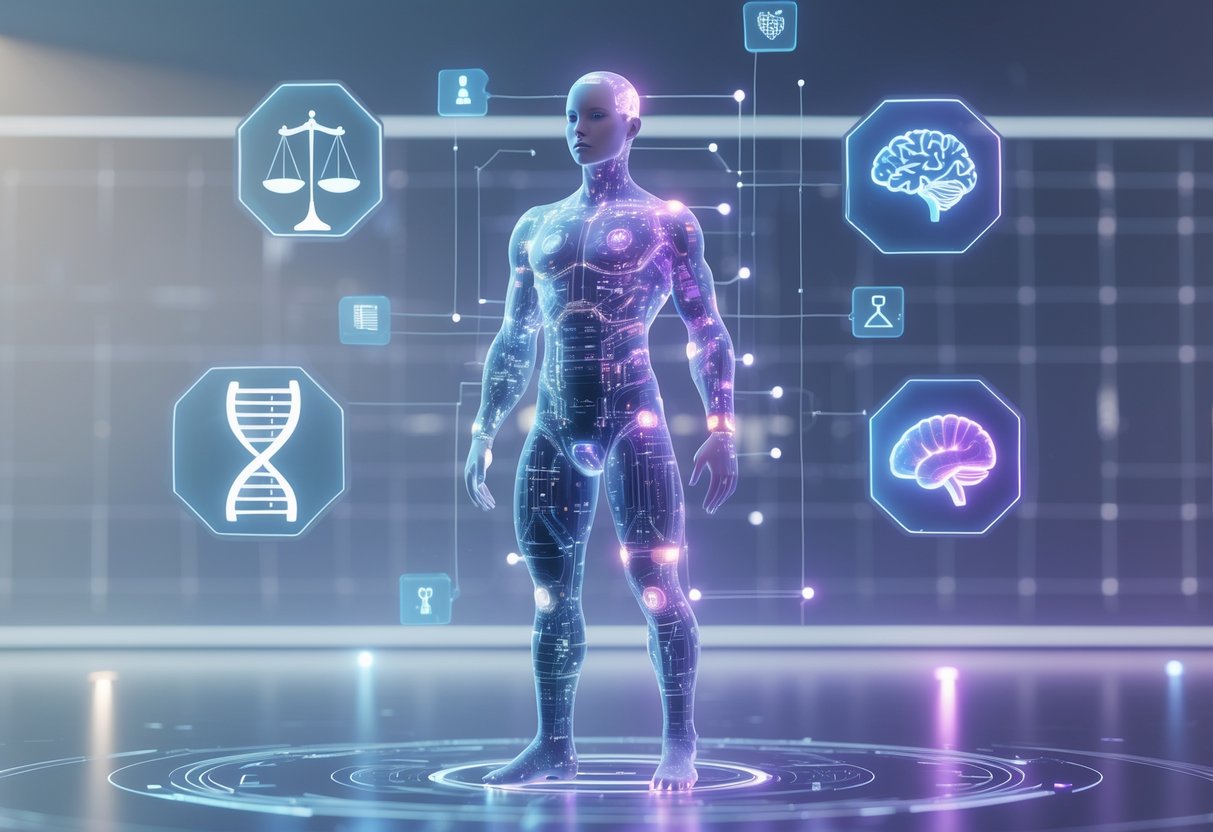Enhancement Ethics: Key Issues, Technologies, and Debates
Updated On: November 13, 2025 by Aaron Connolly
Defining Enhancement Ethics

Enhancement ethics digs into the moral questions that pop up when we use biomedical technologies to boost human abilities beyond what’s needed for basic health. Instead of lumping everything together, this field draws a line between therapies that restore normal function and interventions that push us past what’s typical, all while wrestling with big questions about fairness and what it even means to be human.
Scope of Human Enhancement
Human enhancement basically means biomedical interventions that improve human form or functioning beyond what’s necessary to restore or sustain health. Here, we’re talking about medical technologies—not stuff like education or training.
Enhancement shows up in a few main areas:
- Physical modifications – think cosmetic surgery, growth hormone therapy, or genetic tweaks
- Cognitive improvements – memory-boosting drugs, mood elevators, attention enhancers
- Performance enhancement – blood doping, steroids, endurance meds
- Sensory upgrades – better vision, sharper hearing, or even entirely new senses
We’re leaving out non-medical enhancements on purpose. So, drinking coffee to wake up or meditating for focus doesn’t really count here, even if they do make you sharper.
We focus on interventions that actually change your biology—your body or brain—using drugs, surgery, or genetics. Sure, sometimes the line between medical and non-medical gets fuzzy, but these boundaries help us frame the ethics.
Distinction from Therapy
The treatment-enhancement distinction acts as a big dividing line in bioethics and medicine. Treatments bring you back to normal health, while enhancements push you beyond what’s typical.
This split matters for a few reasons:
| Treatments | Enhancements |
|---|---|
| Insurance usually pays | Usually not covered |
| Medical professionals are expected to provide | Not a standard obligation |
| Gets priority in research funding | Lower on the funding ladder |
But let’s be honest, drawing the line isn’t always easy. The same tool can do both: ankle surgery can fix an injury but also boost an athlete’s performance. It all depends on the context.
Some philosophers aren’t convinced this distinction really works. They say calling something an “enhancement” doesn’t mean it’s less valuable than treatment—especially if it clearly helps people.
Foundational Ethical Questions
Enhancement ethics really pushes us to think about what it means to be human, what’s fair, and what we owe future generations. Do enhancements threaten something essential about us, or are they just the next step in human progress?
Here’s what keeps coming up:
Safety and risk: Many enhancements bring unknown long-term effects. We have to weigh possible benefits against potential harms, especially if genetic changes can’t be reversed.
Justice and access: If enhancements give big advantages, but only some people get them, that could make social inequalities worse. Is that fair, or just personal choice?
Authenticity and identity: Some folks say enhanced achievements aren’t “earned,” or that they mess with who we are. Others shrug and point out that humans have always used tools to get ahead.
Coercion and autonomy: If everyone’s enhancing themselves, do you really have a choice, or do you feel forced to keep up? That’s a big one.
All of these questions tie enhancement ethics to bigger debates about what makes life good, how we treat each other, and what medicine should actually aim for.
Philosophical Foundations of Enhancement

Enhancement ethics stands on some pretty deep questions about what makes us human and whether changing our biology changes our moral worth. The debates usually center on different ideas of human nature and whether our biology is really what defines us.
Notions of Human Nature
Human nature is at the core of these debates. Some philosophers claim we have a fixed biological essence that we shouldn’t mess with. Others say human nature is flexible and always changing.
The essentialist view says humans have certain core traits, and changing them through biomedicine threatens what makes us human. People with this view usually push back against genetic modifications or cognitive enhancements.
The dynamic view sees human nature as something that evolves. We’ve always used tools—from glasses to vaccines—to make ourselves better.
Another approach looks at human capabilities instead of fixed traits. It asks what abilities people need to flourish. Enhancement is okay if it helps us achieve those.
These views shape how we see different enhancements:
- Memory enhancement: Is forgetting part of being human?
- Life extension: Does life’s meaning come from its limits?
- Mood modification: Are negative emotions essential, or just a drag?
Biological vs. Evaluative Human Condition
It’s easy to get tripped up by the difference between the biological and evaluative meanings of “human.” We need to separate what we are physically from what we value about being human.
Biological humanity means being a member of homo sapiens. That’s our DNA, our bodies, our evolutionary history. Biological changes don’t automatically make us less human.
Evaluative humanity is about the qualities we care about—things like:
- Rational thought
- Emotional bonds
- Moral sense
- Creativity
- Autonomy
Critics of enhancement often worry we’ll lose these qualities. But honestly, those worries aren’t always about biology.
Take cognitive enhancement drugs. They change brain chemistry, sure, but they might actually improve rational thinking—a trait we value. So, the biological change could make us more of what we want to be.
This distinction helps us ask better questions. Instead of “Does this make us less human?” we can ask, “Does this support or undermine what we care about in human life?”
Value of the Human Condition
Different ethical frameworks put different values on the human condition as it stands now. These judgments shape whether we see enhancement as progress or a problem.
Conservative approaches find meaning in our limits—suffering, aging, struggle. Enhancement might take away opportunities for growth.
Progressive approaches see limitations as stuff to fix. If we can reduce suffering or expand what people can do, why not? Enhancement is a tool for human flourishing.
Moderate positions try to balance both. Some things about being human are worth keeping; others, maybe not. It’s all about weighing the pros and cons.
Here’s a quick look:
| Value System | View of Enhancement | Key Concerns |
|---|---|---|
| Conservative | Cautious or skeptical | Loss of meaning, character |
| Progressive | Mostly supportive | Maximizing potential |
| Moderate | Depends on the case | Weighing risks and benefits |
These philosophical foundations end up shaping policies—what we allow, what we fund, and what we regulate. If we understand the deeper values, we can navigate the debates a bit more clearly.
Contemporary Enhancement Technologies
The world of enhancement is exploding, from simple brain-boosting pills to wild gene editing that rewrites our DNA. These tools promise to make us healthier, stronger, and maybe even a little bit superhuman.
Biotechnology and Biomedical Interventions
Biomedical interventions are probably the easiest way to enhance humans right now. These range from prescription drugs used in new ways to complex medical procedures.
Cognitive enhancers like modafinil and methylphenidate help healthy people stay awake and focused longer. They started out for sleep disorders or ADHD, but now students and professionals use them to get ahead.
Physical enhancement covers things like anabolic steroids and growth hormones. Athletes and fitness buffs use these to build muscle or recover faster. Of course, these substances can bring real health risks and some pretty big ethical questions.
Cosmetic procedures are no longer just about surgery. Now, you can get minimally invasive treatments to change your face, your body shape, even your eye color. It’s getting harder to tell where treatment ends and enhancement begins.
It’s tricky to separate therapy from enhancement. Many biomedical tools do both, so figuring out how to regulate them isn’t simple.
Genetics and Genetic Engineering
Genetic engineering might be the most game-changing enhancement tech out there. CRISPR has made gene editing way more precise and affordable.
The human genome project mapped all our genes, so now scientists can target the ones linked to intelligence, strength, or disease resistance.
Germline editing lets us change genes in ways that pass to future generations. This could wipe out certain diseases, but it also raises questions about “designer babies” and genetic inequality.
Somatic cell editing changes genes in adults without affecting their kids. This might help treat cancer or muscular disorders and avoid some of the bigger ethical problems.
Right now, most genetic engineering is still experimental. Most of it focuses on treating serious diseases, not boosting normal abilities. But the tech is moving fast, and enhancement uses could be around the corner.
Emerging Biomedical Technologies
New tech is pushing the boundaries of what’s possible. These cutting-edge approaches blend biology, engineering, and computer science.
Neural implants link our brains to computers. Companies are working on devices to boost memory, speed up thinking, or even allow brain-to-brain communication. Early versions already help paralyzed patients control robotic limbs.
Regenerative medicine uses stem cells and tissue engineering to repair or replace body parts. This could mean reversing aging, regrowing limbs, or pushing physical abilities way beyond what’s natural.
Nanotechnology brings tiny machines into the body. These could deliver drugs exactly where they’re needed, fix damaged cells, or monitor your health from the inside.
Gene therapy gives cells new genetic material without changing your DNA forever. This could temporarily boost your immune system or physical performance.
Most of these emerging technologies are still in the testing phase, but the potential for human enhancement is huge.
Cognitive and Moral Enhancement
Cognitive enhancement uses drugs, tech, or training to make our brains sharper. Moral enhancement tries to boost ethical behavior using biology or technology.
Cognitive Enhancement Techniques
Cognitive enhancement comes in a bunch of forms. The most common is using pharmaceutical drugs that were originally meant for medical issues.
Stimulant medications like Ritalin help people focus and stay awake. Students and professionals often use these to improve concentration during exams or crunch time. But using prescription meds without a real need can be risky.
Other ways people try to enhance their brains include:
- Brain training apps and software
- Transcranial stimulation gadgets
- Nootropic supplements
- Meditation and mindfulness
Some of these work better than others. A few give only short-term boosts, while others claim long-term results (but the science isn’t always convincing).
Risks and issues include side effects from meds you maybe shouldn’t be taking. There’s also the fairness question: what happens when only some people get access to these tools?
Moral Enhancement Concepts
Moral enhancement is all about making people more ethical or cooperative—ideally through direct interventions.
Some methods look at using drugs to increase empathy or cut down aggression. Researchers are studying how certain meds affect moral reasoning and prosocial behavior.
There’s a link to cognitive enhancement, too. As people get smarter, they can do more good—or more harm. If intelligence goes up without better moral judgment, that could be a problem.
The hard part is figuring out what “moral improvement” even means. Cultures and individuals have different ideas about ethics. Also, is it really authentic if we change moral behavior artificially?
Research suggests moral and cognitive abilities are connected. If we want to boost one, we might need to work on both.
Radical Enhancement and Transhumanism
Radical enhancement isn’t just about fixing health issues—it’s about boosting human abilities way past what we think of as normal. Transhumanists argue we should use technology to push our minds and bodies beyond current limits, maybe even creating post-humans who could live forever.
Concept of Radical Enhancement
Radical enhancement means raising human abilities far above what’s typical. Instead of just healing a broken leg, people want to make healthy folks much stronger, smarter, or able to live much longer.
Key differences from regular medicine:
- Treatment: Brings someone back to normal
- Enhancement: Improves on normal
- Radical enhancement: Builds superhuman abilities
Imagine having memory that’s ten times better than usual. Or strength that no athlete could ever reach by training alone.
Some people even talk about adding new senses, like seeing magnetic fields. That sounds wild, right?
Ray Kurzweil, a well-known futurist, expects machines to massively boost our thinking. He predicts computers will merge with our brains, making us super-intelligent.
Critics bring up worries about fairness. If only the rich get enhancements, society could split into two groups: the enhanced and the unenhanced. Some folks wonder if these changes would make us something other than human.
Transhumanism and Post-Humans
Transhumanists want to use technology to move past our current human limits. They see our biology as something we can upgrade, not something we have to settle for.
The movement’s big goal? To create post-humans—beings so enhanced they barely resemble us. These future folks might have:
| Enhancement Type | Potential Changes |
|---|---|
| Cognitive | IQ of 500+, perfect memory |
| Physical | Superhuman strength, new senses |
| Biological | Disease immunity, slowed ageing |
Transhumanists claim we have a duty to improve ourselves. Why stick with human limitations when technology could help us get past them?
The Prometheus myth inspires a lot of transhumanists. Like stealing fire from the gods, they want to take charge of evolution. They don’t think “natural” always means “good.”
Some people talk about uploading minds to computers. Others suggest using genetics to make changes that pass on to future children. These ideas raise tough questions about identity and what really makes us human.
Visions of Immortality
Many transhumanists see death as humanity’s biggest challenge. They propose a few different paths to immortality or at least extreme life extension.
Main approaches include:
- Life extension: Slowing or reversing ageing
- Mind uploading: Copying consciousness to computers
- Cyborgisation: Swapping out body parts for machines
Some researchers focus on stopping cellular ageing. Others try to repair age-related damage. They set their sights on “longevity escape velocity”—the idea that we could add more years to our lives faster than we age.
Digital immortality means copying our minds into computers. Supporters say this would preserve who we are forever. Critics aren’t so sure a copy would really be you.
These ideas face huge technical hurdles. We barely understand consciousness or even ageing. The costs could be massive, maybe creating a class of immortal elites while the rest of us stay mortal.
Religious and philosophical concerns pop up too. Many traditions see death as natural or meaningful. Making death optional might totally change how we value life and relationships.
Ethical Theories and Perspectives

Different ethical frameworks give us ways to judge whether human enhancement is okay. Consequentialist approaches focus on results and benefits. Deontological views look at duties and rights. Virtue ethics asks about character and what it means to live well.
Consequentialist Approaches
Consequentialism judges human enhancement by the results and its impact on wellbeing. The big question: does it do more good than harm for people and society?
Utilitarian thinking weighs benefits and risks. Enhanced thinking could make us more productive and reduce big mistakes in fields like medicine or engineering. Better mood regulation might cut down on depression. Longer lives mean more time for relationships and accomplishments.
But negative consequences can’t be ignored. If only the wealthy get enhancements, the gap between rich and poor could get worse. Social pressure to enhance might hurt those who want to stay natural. We really don’t know what the long-term effects on humanity will be.
Key considerations:
- Who gets the benefits and harms?
- What about short-term vs. long-term effects?
- How much choice do individuals actually have?
- Do quality of life improvements outweigh new risks?
Consequentialists usually support enhancement if the benefits clearly win out. They push for fair access and strong safety checks before rolling out new tech.
Deontological Considerations
Deontological ethics cares about duties, rights, and whether actions are right or wrong in themselves. This approach asks if enhancement respects human dignity and basic moral rules.
Human dignity comes up a lot. Critics worry enhancement turns people into projects to be perfected, not individuals to be respected. Supporters say more choices actually respect autonomy.
Rights-based arguments go both ways. Some say people have a right to enhance themselves or their kids. Others say everyone should have the right to stay natural and not face discrimination.
Key deontological principles:
- Respect for persons and their autonomy
- Informed consent for all procedures
- Justice and fair treatment
- Protecting vulnerable groups
Some deontologists flat-out reject enhancement, saying it’s wrong no matter what. Others allow it if people truly consent and their dignity stays intact.
Virtue Ethics and Enhancement
Virtue ethics asks if enhancement helps or hurts our character and ability to flourish. It’s about the kind of people we become and how technology shapes our moral growth.
Character development is central here. Enhancement might make it easier to be patient or brave. Or, it could make us lazy, relying on pills instead of effort.
Authentic achievement is another debate. If someone uses smart drugs to solve tough problems, do they really deserve credit? Some worry that tech shortcuts break the link between effort and accomplishment.
Human flourishing considerations:
- Finding balance between virtues and talents
- Does struggle help form character?
- Are improvements authentic or artificial?
- What happens to community values and traditions?
Virtue ethicists sometimes support enhancement if it helps people grow and show good character. But they push back against tech that replaces personal growth or messes with the social habits that build virtue.
Social and Cultural Impacts
Enhancement technologies are changing how we see human ability and fairness. They also affect our views on disability and shake up what counts as real achievement in sports and life.
Changing Concepts of Disability
Enhancement tech challenges our old ideas of what’s “normal.” If we can use genetics to prevent things like deafness or blindness, we have to ask: is disability always something to fix?
Many in the deaf community, for example, don’t see deafness as a problem. They treat it as a cultural identity. Enhancement options could pressure families to “fix” traits that some people actually celebrate.
Medicine debates whether enhancement sets impossible standards for the human body. If brain boosters become common, will we expect everyone to use them? Suddenly, natural differences might look like flaws.
We could accidentally create new “normals” that leave more people out. The enhanced might become the standard, making the unenhanced seem disabled.
Culture matters a lot here. Some societies really value natural limits and differences. Others embrace tech upgrades. These attitudes shape how communities react to enhancement.
Implications for Sports and Achievement
Enhancement tech forces us to rethink what “fair play” means in competition. Sports used to rely on natural ability, with some gear allowed. Genetic mods throw all that up in the air.
We already argue about performance-enhancing drugs. Now, enhancement could change an athlete’s biology permanently, not just for one event.
Pro sports might need separate leagues for enhanced and unenhanced athletes. That raises messy questions: how do you test for gene edits made years ago?
Academics and work face similar dilemmas. If smart drugs are everywhere, should schools allow them? Students without access could fall behind for good.
What counts as human achievement shifts when tech boosts performance. Olympic records mean something because they show peak human ability. Enhanced athletes could make those records meaningless.
Jobs could become unfair if enhanced people always outperform others. Workers might feel forced to enhance just to stay employed.
Justice, Equity, and Access

Enhancement tech raises tough questions about fairness and who gets access. We have to think about how to share enhancement benefits, avoid making the rich even richer, and make sure the rest of the world doesn’t get left out.
Distributive Justice in Enhancement
Distributive justice asks how we share enhancement benefits fairly. Should everyone get equal access to gene editing or brain boosters? Or just basic healthcare, leaving extras to private buyers?
Enhancement policy needs to balance personal freedom with the common good. Some say letting the wealthy buy better genes creates unfair competition in school, work, and life.
Here are some ways to distribute enhancements:
| Model | Approach | Example |
|---|---|---|
| Universal Access | Government gives basic enhancements to all | Subsidised genetic therapies |
| Market-Based | Private purchase, little regulation | Cosmetic genetic modifications |
| Lottery System | Random allocation if supplies are tight | Clinical trial participation |
The service view says decisions about enhancement should help communities, not just individuals. That shifts the focus from autonomy to the greater good.
Socioeconomic Inequality
Biomedical enhancement could make class divides even bigger. Pricey gene treatments might give the rich biological advantages that stack up over time.
Think about memory or focus boosters. Wealthy families could buy these for their kids, giving them a head start that lasts for life.
Gene-environment interactions make things trickier. Enhanced genes help more if you already have good nutrition, education, and healthcare.
A warning: Enhancement markets with no rules often overhype results and mislead buyers.
This leads to “genetic injustice”—the same enhancements give different results depending on your social background. Poorer people might get less benefit because they lack support.
Possible fixes:
- Sliding scale pricing so cost matches income
- Public programmes to give everyone essential enhancements
- Rules for advertising to keep claims honest
Global Accessibility
Enhancements usually show up first in rich countries, creating big gaps worldwide. Many developing nations don’t have the tech or clinics for advanced therapies.
The World Health Organization says we need global coordination on enhancement. Countries with different rules can lead to “enhancement tourism”—people traveling for treatments they can’t get at home.
Cultural attitudes matter too. Some places value the group over the individual, or vice versa. That shapes what people are willing to try.
Barriers to global access include:
- High costs that favor rich countries
- Weak regulation in poorer nations
- Brain drain as enhanced people move to better jobs
One idea: International agreements could set basic safety rules but let each country handle details their own way.
Some folks suggest sharing patents and tech to lower costs and spread benefits. That could keep enhancements from piling up in just a few places.
Regulation, Policy, and Governance

Governing human enhancement means juggling innovation and safety. Countries use different medical and legal frameworks to regulate enhancements, but global coordination still feels pretty scattered.
Policy Approaches to Enhancement
Most countries handle enhancement policies through existing medical regulations. Regulatory agencies usually treat enhancement technologies as offshoots of therapeutic medicine.
Current Policy Models:
- Therapeutic model: Enhancement drugs go through standard pharmaceutical approval.
- Medical device regulation: Officials require safety testing for physical enhancement devices.
- Professional oversight: Medical boards limit access through licensing.
Take the UK, for example. The Medicines and Healthcare products Regulatory Agency (MHRA) applies the same safety standards to enhancement products as they do to regular treatments.
Policy makers often struggle to separate therapy from enhancement. If a cognitive drug helps dementia patients, but also boosts memory in healthy people, where’s the line?
Key Policy Questions:
- Should doctors supervise enhancement use?
- What counts as “normal” human function, anyway?
- What safety standards should non-medical enhancements meet?
Some countries take a pretty relaxed approach, while others clamp down. The Netherlands lets people use certain cognitive enhancers with a doctor’s guidance. Meanwhile, Germany keeps non-therapeutic enhancement tightly controlled.
Ethical Oversight
Ethical oversight committees look at enhancement research and applications before they reach the public. These groups try to balance possible benefits with risks and social consequences.
Primary Oversight Mechanisms:
- Research ethics committees: Review studies involving enhancement.
- Professional ethics boards: Advise medical professionals.
- National bioethics councils: Guide government policy.
The UK’s Nuffield Council on Bioethics weighs in on enhancement ethics. They dig into issues like fairness, consent, and how society might change.
Ethics boards consider autonomy, social justice, and coercion when they review proposals.
Common Ethical Concerns:
- Access and equality: Who actually gets a shot at enhancement?
- Informed consent: Do people really know the long-term risks?
- Societal pressure: Will people feel forced to enhance themselves just to keep up?
Medical ethics committees often find enhancement cases tough. Classic medical ethics focus on healing, not on upgrading normal function.
Some oversight groups write special guidelines for enhancement. They try to tackle ethical problems that standard medical rules just don’t cover.
International Perspectives
Enhancement regulations look very different from country to country. There’s no international agreement on how to handle human enhancement tech.
Regional Approaches:
| Region | Regulatory Style | Key Features |
|---|---|---|
| European Union | Precautionary | Strict safety rules, limited access |
| United States | Market-based | FDA oversight, more products available |
| Asia-Pacific | Mixed | Some countries are strict, others are pretty open |
The World Health Organisation offers advice, but they can’t actually enforce anything. Every nation sets its own policies.
Some countries really push enhancement research, while others hold back. Singapore invests a lot in new enhancement tech. Switzerland acts more cautiously and keeps tight controls.
International Coordination Challenges:
- Regulatory arbitrage: People travel to get enhancements elsewhere.
- Research mobility: Scientists move where rules are looser.
- Commercial competition: Countries fight for the enhancement industry.
Cross-border enhancement brings a mess of governance problems. Enhancement tourism leaves regulatory holes and safety risks.
Professional medical organizations try to coordinate internationally. The World Medical Association writes ethical guidelines for member countries to follow.
Historical Context and Debates

The ethics of enhancement grew out of centuries of philosophical debate over human improvement. The ugly history of 20th-century eugenics and ongoing unease about biotechnology still shape these conversations. Today, people argue about where to draw ethical lines between healing and enhancement. Francis Fukuyama, for one, warns about changing human nature too much.
The Enhancement Debate
The modern debate really picked up speed in the 1990s, as biomedical tech took off. Philosophers started asking if we should use these tools for more than just healing.
Key debate themes:
- Treatment versus enhancement—hard to separate
- Individual rights versus the good of society
- Natural versus artificial ways to improve
- Fairness and equality
Supporters and critics often talk past each other, drawing from different philosophies. Enhancement fans talk up freedom and human potential. Critics worry about safety, coercion, and social justice.
Some scholars point out that humans have always tried to better themselves—education, training, tools, you name it.
But now, biotech lets us change our bodies and minds directly. That brings up new questions about who we are.
Eugenics and Ethical Lessons
Eugenics casts a long, dark shadow over enhancement discussions. Governments forced sterilization and even committed genocide in the name of “improvement,” all based on bad science and racism.
This history leaves us with some hard lessons:
State coercion dangers – Government-run enhancement programs could repeat eugenic atrocities.
Social bias risks – Enhancement standards might just reflect old prejudices, not real progress.
Scientific humility – We still don’t know as much about genetics and improvement as we’d like to think.
Modern enhancement advocates try to distance themselves from eugenics. They stress personal choice, solid science, and diversity—not state control or wiping out differences.
Still, critics worry the risks are too high. Enhancement could bring new discrimination and widen inequality.
Influence of Public Opinion
Public attitudes really shape enhancement policy and funding. Surveys show people feel conflicted about different kinds of enhancement.
Most folks are okay with medical treatments, but “lifestyle” enhancements get pushback. Treating depression? Fine. Boosting memory for healthy people? Not so much.
Factors affecting acceptance:
- Safety concerns – People worry about unknown, long-term effects.
- Fairness issues – Enhancements could make inequality worse.
- Religious beliefs – Some see enhancement as crossing a line, even “playing God.”
- Cultural values – Different societies have their own comfort zones.
The media tends to hype enhancement research, sometimes stirring up wild hopes or unnecessary fear.
Francis Fukuyama’s book “Our Posthuman Future” made a big splash. He argues enhancement threatens human dignity and equality, and a lot of policymakers listen.
Public opinion can shift research priorities and how strictly different countries regulate enhancement.
Key Figures and Thought Leaders

The enhancement ethics debate has some big names shaping the conversation. Nick Bostrom pushes for transhumanism, Francis Fukuyama warns about biotech’s dangers, and Ray Kurzweil predicts we’ll merge with our machines.
Nick Bostrom’s Influence
Nick Bostrom stands out as a leading voice for human enhancement. He helped found transhumanist philosophy and says we might even have a moral duty to improve ourselves.
Core Philosophy:
- Humans should use technology to overcome biological limits.
- Enhancement can cut suffering and boost well-being.
- Future generations deserve better abilities than we have now.
Bostrom questions the value of “natural” human traits. He thinks a lot of what we call human nature just causes pain or holds us back.
He also links enhancement to existential risks. Bostrom suggests smarter humans could make better choices about threats to humanity’s survival.
Key Contributions:
- Built formal arguments for why we might owe enhancement to future people.
- Tackled tough objections about equality and dignity.
- Connected enhancement to the long-term survival of our species.
Perspectives of Francis Fukuyama
Francis Fukuyama takes a much more cautious view. He argues that biotechnology could break the bonds of human equality and shake up society.
Main Concerns:
- Enhancement could split people into “enhanced” and “normal” classes.
- Biotech might change what it means to be human.
- Democracy relies on shared human experience.
Fukuyama doesn’t oppose all medical interventions. He draws a line between restoring health and going beyond what’s normal.
His background in politics shapes his ethics. Fukuyama cares about how enhancement might affect social institutions and democracy.
Warning Signs:
- Genetic changes that create permanent class divides.
- Drugs that alter personality in deep ways.
- Tech that chips away at human agency.
He calls for strong oversight, not an outright ban on enhancement research.
Contributions of Ray Kurzweil
Ray Kurzweil comes at this from a tech-predictor’s angle. He sees a future where humans and machines blend together.
The Singularity Theory:
- Computers will outthink us sooner than we expect.
- Biology and technology will merge.
- Enhancement isn’t really optional—it’s just where we’re headed.
Kurzweil doesn’t get too bogged down in ethics. He’s more interested in how we should get ready for what’s coming.
Timeline Predictions:
- 2030s: Nanobots in our blood, watching our health.
- 2040s: Machines smarter than humans.
- 2050s: Humans and AI fully integrated.
He’s way more optimistic than most philosophers. Kurzweil sees enhancement as the next step in evolution, not a moral crisis.
He wants to see more research into longevity and brain upgrades right now. Instead of arguing about “should we,” he’s focused on “how do we do it?”
Frequently Asked Questions

These questions dig into how enhancement tech could change fairness, society, and what it means to be human. Let’s look at the moral puzzles, social effects, and evolutionary twists that come with boosting human abilities.
What are the ethical implications of using technology to enhance human abilities?
Enhancement tech really makes us rethink what it means to be human. When we ramp up intelligence or strength, we have to face safety risks and unknown long-term effects.
Autonomy matters—a lot. People should pick their own enhancements, but they need the facts to make those choices.
Fairness gets tricky if only some people can afford enhancements. The wealthy could get big advantages in school, work, or sports.
Authenticity comes up too. If someone wins because of enhancement, is it really their achievement? That question nags at a lot of folks.
How does human enhancement technology challenge traditional moral values?
Enhancement shakes up our ideas about natural limits and dignity. Many people believe we shouldn’t mess with what makes us human.
Religious and cultural traditions often say we should accept ourselves as we are. Enhancement sometimes clashes with beliefs about creation or natural order.
If a pill can make you smarter, does hard work still matter? That’s a tough one for people who value effort and perseverance.
Equality gets even harder to protect. Enhancement could split society into different classes with different abilities.
What are the potential benefits and drawbacks of adopting human enhancement on a societal level?
Enhanced humans might tackle big problems like disease or climate change faster. Cognitive enhancement could speed up innovation.
Physical upgrades might mean fewer healthcare costs. Healthier people could need less medical care.
But enhancement could also make social divides worse. The rich and powerful might pull ahead, leaving others behind.
People might feel pressured to enhance just to keep up. That could get exhausting or even dangerous.
We still don’t know the long-term effects. Enhancements could have unexpected impacts on future generations.
In what ways could human enhancement influence the evolution of our species?
Enhancement could turbocharge human evolution. Changes that used to take millennia might happen in a few decades.
If genetic enhancements get passed to kids, we could see permanent shifts in human DNA. That’s a big deal for everyone down the line.
We could even split into different human groups—enhanced and unenhanced—each going their own way.
Natural selection might not matter as much. Artificial traits could take over.
Nobody knows if enhancement will boost diversity or make us all more alike. It could go either way.
How might the widespread use of enhancement technologies affect social inequality?
Enhancement might create bigger gaps between social classes than we’ve ever seen. Enhanced people could just outpace everyone else.
At first, only the wealthy will likely have access. That could let rich families lock in their advantages for generations.
Employers might prefer enhanced workers. That could leave unenhanced people struggling to find good jobs.
Schools will face tough questions. Should all students compete together, or do we separate the enhanced from the rest?
Countries with more enhancement access might dominate those without. Geographic inequality could get even worse.
Can the pursuit of human enhancement be reconciled with the principles of fairness and justice?
Fairness really depends on whether everyone can access beneficial enhancements. If we use public funding, maybe we can make sure enhancements don’t just end up as toys for the rich.
Justice isn’t just a buzzword—it means we’ve got to look out for vulnerable groups. Kids and people with disabilities deserve extra thought when we make decisions about enhancements.
Honestly, we might have to rethink what fairness even means in a world full of enhanced people. Maybe equal opportunity should be about giving everyone basic enhancements to level the playing field.
Regulation steps in to keep things safe and stop anyone from taking advantage. When there’s proper oversight, people are less likely to fall for dangerous or fake enhancement products.
It’s not just a local problem, either. If countries work together, maybe we can set global standards and keep enhancements from making inequality between nations even worse.
Some folks say banning enhancements altogether is the only way to be fair. Others argue that if we regulate wisely, we can keep both innovation and justice alive.

